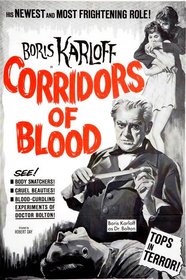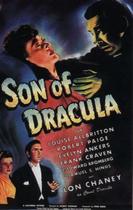Our editor-in-chief Nate Yapp is proud to have contributed to the new book Hidden Horror: A Celebration of 101 Underrated and Overlooked Fright Flicks, edited by Aaron Christensen. Another contributors include Anthony Timpone, B.J. Colangelo, Dave Alexander, Classic-Horror.com's own Robert C. Ring and John W. Bowen. Pick up a copy today from Amazon.com!
Corridors of Blood (1958)
Robert Day's Corridors of Blood is a provocative, taut early installment of the medical thriller made popular by contemporary authors such as Robin Cook and Michael Crichton. It's 1840 in London, and Boris Karloff is Dr. Thomas Bolton, a well-meaning surgeon who moonlights once a week as a general practitioner for the poor. Since he performs amputations, his research focuses on developing anesthetics to make surgery painless. Supported by his son and niece, Bolton publicly displays his latest development, a primitive form of gaseous anesthesia, but his demonstration fails miserably when his patient awakens while Bolton is cutting his arm. Chaos ensues, and Bolton is suspended from practicing medicine. Nevertheless, he continues his research, and becomes addicted to the anesthetic gases. When his notebook is stolen and resources run out, he's forced to collude with a group of criminals and murderers who have been swindling local hospitals (and Bolton too, unbeknownst to him) in a nefarious conspiracy. Eventually, the police investigate, and Bolton's fate is secured.
Corridors greatest strength is Karloff's portrayal of the conflicted, antiheroic Dr. Bolton. The good doctor boasts a sentimental soft side: in addition to his surgical duties, he not only administers medical care to the poor - against the advice of colleagues - but he gives one poor woman and her daughter money to make ends meet. Later, when he must perform surgery on the girl, he momentarily "loses it" because his frustration with the health care "system" is too overwhelming. This frustration is foreshadowed earlier when the experience of seeing a former patient in a tavern pathetically traumatized by the sight of his amputated leg shocks the good doctor. Bolton's intentions are clear: he just wants to help his patients live pain-free.
Furthermore, Bolton is an easy character to empathize with because he's governed by intense emotions and passions, like many of us. When his public demonstration falls apart, he's understandably humiliated and consequently haunted by his failure. He wants to avenge that spectacle and his nemesis, whose exploitation of Bolton's failure produces this frustrating refrain: "pain and the knife are inseparable." However, Bolton's impetuous pursuit of synthetic anesthesia, along with his angry outbursts and general impatience, prevent him from doing so.
His knowledge, altruism, frustration, passion, and humiliation, however, produce a combustible potion that leads to his demise. Blinded by his pursuit of pain-free surgery and slowed by a lack of test subjects and public rejection, Bolton resorts to rigorously testing the gases himself. While this research model initially works, he quickly becomes addicted to the "inhalations" as his stress and adversity mounts, a troubling development that distorts his judgment. Although early in the film he is tricked into signing death certificates falsely (the cadavers had actually been murdered), he later signs them willingly, knowing the conspirators, led by "Black Ben" and "Resurrection Joe" (the latter played creepily by Christopher Lee), have committed murder. However, in his altered mental state, a modicum of unethical behavior in the present is a reasonable tradeoff for ultimately eliminating surgical pain. Bolton's conflict is narrowed to this ancient paradox of medical ethics: Is it worth sacrificing and killing a few for the greater good of many?
When he later collaborates with Joe in committing multiple crimes, his descent is complete. However, in true antiheroic style, Bolton fully acknowledges his flaws after the police intervene when he says to his son that he was "too anxious to prove my theories". This recognition of guilt inspires his son, who successfully continues his father's research and manifests his dream that "pain and the knife can be separated".
Ben and Joe are effectively unsettling, and their conspiracy is splendidly dark. They lure innocents into their tavern with friendly stooges or seductive women, get them drunk (or drunker) by having sexy female patrons flirt with them, and then lure them upstairs and suffocate them. After persuading a doctor such as Bolton to sign a death certificate certifying that the individual died of natural causes, they sell the cadaver to hospital officials to be used for research. Ben's cavalier attitude toward this conspiracy, along with his equatorial frame and deep, bellowing laughs, make him an intimidating figure. And Joe's dirty black coat, facial scars, and corrupt determination complement Ben well. While Ben is the Machiavellian ringleader, Joe is the capable executor of his evil designs.
The film's most visually pleasing scenes are those that depict the underbelly of London's side streets, awash with shadow, grime, and claustrophobic corners. At times, the set design looks similar to the great German expressionist masterpiece The Cabinet of Dr. Caligari, with its angular, geometric lines piercing our eyes. The great city's lamplit atmospherics are on full display through most of Corridors as is the general Victorian mood of dark and dusty Industrial Revolution nights established by great storytellers such as Dickens, Stevenson, or Conan Doyle.
Horror fans will drool over those scenes when Karloff and Lee are together. Although their pairing doesn't last long, watching the legends together in a few short scenes - commiserating over deceased souls, stealing chemicals from a dispensary, and eluding the police - should inspire any horror fan. It's rare to visually watch one generation's icon hand over the baton to another.
A pleasantly surprising film, Corridors is a provocative meditation on the health care profession's nascent years, and because it manages to seriously address important social and professional issues such as biomedical ethics, Corridors demonstrates how horror films can effectively tackle important, serious topics. Once again, with Karloff and Lee in the driver's seat, the genre delivers.
This review is part of our Shocktober Classics 2009: Staff Screams event.








